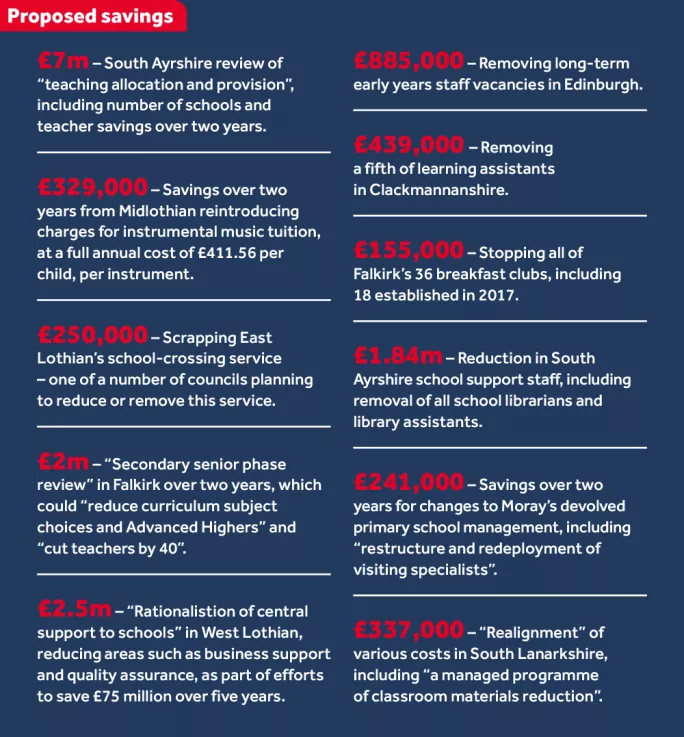Councils’ education budgets ‘on a precipice’

Analysis of local authority budget proposals shows that education may be more vulnerable to budget cuts than at any time in recent memory.
With most councils setting their annual budgets next month, some are considering drastic proposals, including a reduction in teachers and the range of subjects open to secondary pupils.
Council bosses say they are dealing with huge financial pressure - Moray warns that it stands “on the edge of a financial precipice” - so even areas of flagship government policies are affected, including additional support, class sizes and vocational education.
However, the encroachment of budget cuts into subject choices made by older secondary pupils - an area councils have been loath to touch in the past - is perhaps most surprising. Falkirk, for example, is planning a “secondary senior phase review” to save £2 million over two years by narrowing pupils’ options. If agreed, it would “reduce curriculum subject choices and Advanced Highers” and “cut teachers by 40”. Similarly, Clackmannanshire Council has proposed to “reduce secondary school subject choices” to save £352,080.
Sweeping review
South Ayrshire plans a sweeping review of “teaching allocation and provision”, including the number of schools and teachers, “which could result in bigger class sizes” to save more than £7 million over two years.
The SNP government’s ambition to reduce class sizes is also looking forlorn in South Lanarkshire, where in P1 they could be pushed up to the legally allowed maximum of 25.
A common theme is more decisions and responsibility shifting from councils to schools, echoing government ambitions designed to empower headteachers.
West Lothian Council, for example, needs to save £75 million over five years and is targeting a “rationalisation of central support to schools” - reducing areas such as business support and quality assurance - to claw back £2.5 million. The same council would save £3.6 million with a “redesign” of devolved school management, although this proposal lacks details.

Additional support for pupils and teachers is targeted repeatedly. South Lanarkshire, for example, proposes removing dedicated behavioural support staff from schools - saving £85,000 - and losing 10.5 of its 67 full-time equivalent school technicians, saving £350,000 a year. Midlothian would save £198,000 in 2018-19 by shedding 10 per cent of learning assistants, while Clackmannanshire plans to lose a fifth of its learning assistants, which would amount to a saving of £439,000.
Meanwhile, vocational education - supposedly a greater priority than ever, since Sir Ian Wood’s Developing Scotland’s Young Workforce report in 2014 - is also targeted.
Midlothian proposes to “reduce the vocational opportunities available to schools and young people” as part of its plans to save £184,000 in 2018-19.
Tes Scotland has previously highlighted other vulnerable areas, including music (“Scotland’s music tradition ‘under threat from school cuts’”, bit.ly/MusicCuts), school libraries and outdoor education (“‘Extreme anger’ over library cuts”, Tes Scotland, 15 December).
‘Direct impact’
Scottish Labour finance spokesman James Kelly has pointed to analysis by the Scottish Parliament Information Centre as confirmation that the government draft budget set just before Christmas would “hammer” local services, including education.
A spokesman for local authorities body Cosla - which complained of a “£153 million cut for essential local government services” in the budget - says: “Reduction to councils’ funding overall certainly won’t improve the situation regarding cutbacks.”
Schools Leaders Scotland general secretary Jim Thewliss says that any cuts with a “direct impact on young people’s life chances” should be discussed with headteachers, because this “might lead to a more proportionate, considered and long-term sustainable approach” to budget difficulties. SLS president David Barnett said in an interview with Tes Scotland last week that education could no longer assume the same level of protection from local cuts as in the past.
A Scottish government spokesman says: “Local government funding to schools has been very fair and is increasing, despite the cuts to the Scottish budget from the UK government. We want far more decisions on school funding to be in the hands of those with the expertise and insight to target resources at the greatest need - the schools themselves. That’s why we consulted on fairer funding for schools, as set out in the Programme for Government, and we are committed to producing firm proposals by summer 2018.”
He adds: “Our education reforms are focused on giving schools and headteachers more power and money to raise standards and close the gap. They will deliver extra help for teachers in the classroom, more professional development and a stronger voice for parents and pupils.”
You need a Tes subscription to read this article
Subscribe now to read this article and get other subscriber-only content:
- Unlimited access to all Tes magazine content
- Exclusive subscriber-only stories
- Award-winning email newsletters
Already a subscriber? Log in
You need a subscription to read this article
Subscribe now to read this article and get other subscriber-only content, including:
- Unlimited access to all Tes magazine content
- Exclusive subscriber-only stories
- Award-winning email newsletters